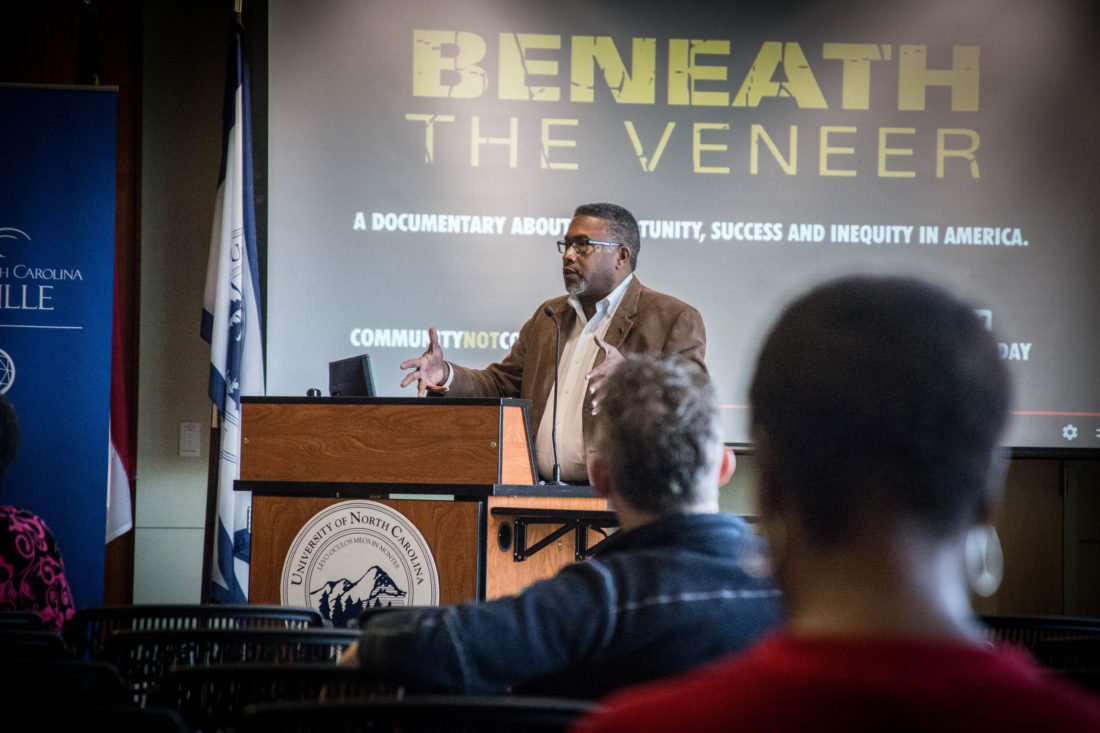Throughout his career, Darin Waters has worked to counter a false understanding of local and regional history. “For a long time,” says Waters, a professor of history at UNC Asheville, “there was this fallacy that there wasn’t much of an African-American presence in the region.” That impression is still “a very dominant theme,” but it is changing, he says.
Along with the work of Waters and other scholars, high-profile conferences such as the African Americans in Western North Carolina and Southern Appalachia — which takes place Thursday through Saturday, Oct. 18-20, in Asheville — have contributed to a growing awareness of the significance of black contributions to the development of this region. The fifth annual conference will focus on a theme of “Making the invisible visible” to continue the work of shining new light on local African-American history.
Waters cites recent controversies over Civil War monuments as one outcome of the imbalance between dominant historical narratives and those which have been overlooked.
“We as a community and as a nation have multiple histories, and some of those histories … in the larger narrative of American history have been kind of marginalized,” Waters says. “This is an effort to bring those marginalized stories more to the center of the stage.”
The event’s Thursday night keynote address will be delivered by William H. Turner, a professor emeritus at Prairie View A&M University in Texas, who Waters described as “essentially one of the pioneering scholars on blacks in Appalachia.”
Turner, who delivered a lecture at UNC Asheville in February about the civil rights movement in Appalachia, told Xpress earlier this year that he became aware of the lack of black representation in the region’s historical record while studying at the University of Kentucky in the 1960s. “The long-standing impression was that there basically weren’t any black people of any significant numbers in the mountains of the South,” he said. “I took it upon myself, along with some other people I knew, to try and fill that void.”
In addition to a series of presentations in the morning and afternoon on Friday, UNC Asheville will recognize four retired faculty members, Dolly Jenkins-Mullen and her husband, Dwight Mullen, and Charles James and his wife, Deborah Grier-James, by naming the campus humanities building in their honor. The building will be called the Mullen & James Humanities Hall.
Waters says the four were among the first black professors at the university. “Their work, I think, has been … groundbreaking in paving the way for other minority faculty who have come behind them,” he says.
The two couples faced hostility and racism early in their careers, the university said in a press release about the renaming.
Mullen received death threats as a result of his political commentaries, and Charles and Deborah were denied housing near the UNC Asheville campus soon after they graduated from the university in the 1970s. The four were eventually hired by the university in 1984.
“Each of them went on to make tremendous contributions on and off campus,” the university said in the press release, “and to earn the gratitude of countless students as teachers and mentors.”
Events on Saturday will explore the local minority business community, the regional craft heritage of African-Americans, and local ties to famed jazz singer and pianist Nina Simone, who was born in Tryon on Feb. 21, 1933, and attended Allen High School on College Street. Established in the 19th century to provide educational opportunities to the African-American community, the institution operated as a boarding high school for girls during Simone’s time there.
A celebratory brunch will honor the school and Simone and will feature remarks from Sylvia Pate, a 1965 graduate of the Allen High School. Organizers will host a screening of the documentary film What Happened, Miss Simone? at 2:30 p.m.
Kimberlee Archie, Asheville’s equity and inclusion manager and a member of the conference planning committee, notes that many of Simone’s songs ruminate on difficult aspects of American history. “The lyrics of those songs tell a story that the United States doesn’t necessarily want to look in the mirror and admit to,” she says.
Archie moved to Asheville in July 2017 to serve as the city’s equity and inclusion manager. She lived in Charlotte before that and is originally from Seattle. Archie arrived in Asheville just in time for last year’s conference and cleared her schedule to attend. “I’m doing work that is important to the people that live here, so it was important for me to go,” she says.
Past conferences have featured keynote speakers including James Ferguson, an Asheville native and prominent Charlotte-based attorney, and Superior Court Judge Yvonne Evans, who grew up in Hendersonville and attended Allen High School. Seeing prominent local figures reconnect with the community can have a galvanizing effect, Waters says.
“I think history can serve as a source of encouragement,” Waters says. “When you see people who have gone on to do some really big things, it lets you know that there’s possibilities for you as well.”
History, Archie says, tends to repeat itself when people are ignorant of it — especially the negative parts.
“If you don’t understand the events that have brought us to the current situations that we’re in,” Archie says, “we’re doomed to repeat them.”



Before you comment
The comments section is here to provide a platform for civil dialogue on the issues we face together as a local community. Xpress is committed to offering this platform for all voices, but when the tone of the discussion gets nasty or strays off topic, we believe many people choose not to participate. Xpress editors are determined to moderate comments to ensure a constructive interchange is maintained. All comments judged not to be in keeping with the spirit of civil discourse will be removed and repeat violators will be banned. See here for our terms of service. Thank you for being part of this effort to promote respectful discussion.